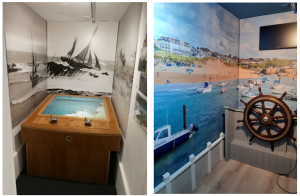The wAVE Project: a Film on the Development of Immersive Technology Experiences in Cornwall
The wAVE (Augmented and Virtual Experiences) Project has been developed by Cornwall Museums Partnership alongside Cornwall and the Isles of Scilly Local Enterprise Partnership and Falmouth University. It aims to use Cornwall’s distinctive heritage to support digital innovation and economic diversification in five coastal communities by maximising Cornwall’s digital infrastructure, skills, and heritage for the benefit of the local economy. The county’s distinct history coupled with its growing immersive-tech sector has created a unique opportunity to position Cornwall at the forefront of the transformative potential of such technology. wAVE is the internal name of the project, while the project’s public-facing name is Coastal Timetripping.
wAVE has now launched a film, created by Idenna Creative, that gives an insight into the inception, development and future aims of the wAVE project, which you can watch here:
This film brings together interviews from the project’s partners, as well as the museums involved. It has been filmed across five coastal communities and inside St Agnes Museum, one of the museums that hosts an immersive experience, giving viewers a visual introduction to the project. The interviewees include Roger Radcliffe, Chair of St Agnes museum, who said:
“Very quickly we realised that there was a great opportunity to have something that’s a bit more cutting edge and also an opportunity to benefit in other more subtle ways. Improving the collection and the care of the collection… we have come up with benefits like contactless donations points for example.”

Before and After: the transformation of the immersive experience at Bude Castle
In addition to the immersive experiences, wAVE has also provided training on this technology and its applications to encourage creative thinking around how it can be used in the heritage sector. St Agnes Museum serves as a great example of how the wAVE project has already had an impact on the participating museums, as well as how it can lead to long-term development beyond the initial launch of the five immersive technology experiences. Cornwall is now in a unique position, due to its rich heritage and tourism assets, to showcase what immersive technology can do for the heritage sector and begin to lead the way in this development.
As well as interviews on the project, the film also shows a snippet of the St. Agnes experience. In this Virtual Reality experience visitors can see how the harbour once looked as a bustling centre of the mining industry. The harbour, complete with people and arriving ships, has been thoroughly researched and re-created to look as it would have in 1900. You can find out more about the other immersive experiences on the wAVE webpage here, though due to lockdown measures we have been unable to take any films or pictures of the other experiences. However, we hope to launch the experiences in the coming spring, and look forward to being able to share more visual information then.

Ellie Smith, the Project Support Apprentice at CMP, also talks more on the intended benefits of wAVE for the local communities involved:
“A huge part of the project is about increasing commerce in the communities that the partner museums exist in, so a lot of the marketing effort is actually going towards really highlighting these businesses and creating almost itineraries that people can follow. They can visit the museum but as part of their visit we see it as exploring the community and going to visit these business”
The wAVE project ultimately aims to use the immersive experiences it has developed to benefit the museums and local economy. First, by offering a better potential for year-round tourism and second, by targeting younger millennial and generation Z tourists in England and abroad. Finally, all the immersive experiences have been developed based on the coastal communities in which they are based, whether it is an app that encourages users to travel around the area or an experience that is based on a distinctive site such as Bude canal. This encourages users to treat the experiences as a part of exploring and enjoying the local area, thus benefitting all tourism-based businesses in the area.

To find out more about how the wAVE project is marketing these experiences, you can go to the Coastal Timetripping website or Instagram. There is also a trailer for Coastal Timetripping which you can watch below:
– Magali Guastalegnanne, wAVE Digital Marketing Intern